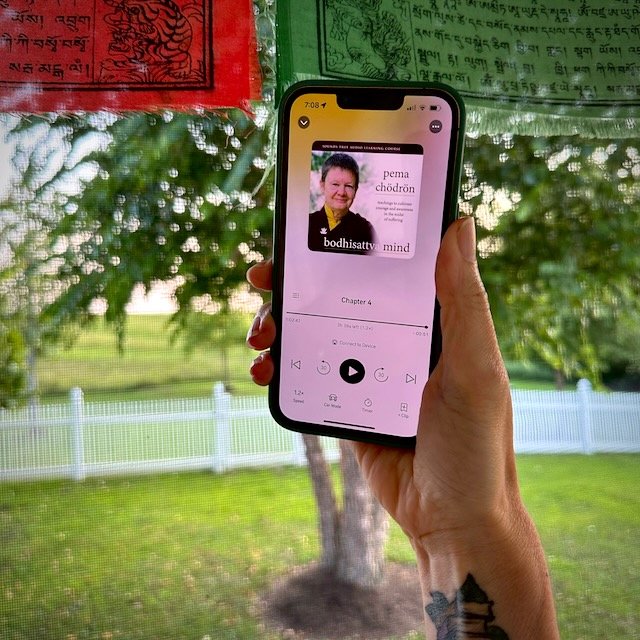Bodhisattva Mind: Teachings to Cultivate Courage and Awareness in the Midst of Suffering (by Pema Chodron)
Pema Chodron was asked to come out of her own retreat to offer a weekend retreat to a group at the Naropa Institute in Boulder, Colorado. Chogyam Trungpa Rinpoche, founder of Naropa, was one of her teachers, so of course she wasn’t going to refuse this request. 😅 Pema’s teachings over that weekend were recorded in front of the live audience and produced in audiobook format for everyone to enjoy. Pema had an assistant with her who read passages, and then she defined and explained each passage in an applicable manner. A few times throughout the audiobook there were question and answer portions between Pema and the audience.
Pema taught the Bodhisattva Mind: Teachings to Cultivate Courage and Awareness in the Midst of Suffering. I love that Buddhist teachings are extremely relatable to my daily life. To apply them is to do so with kindness and compassion towards self. Listening to these teachings can be repetitive for me, which I need, and provide me with new wisdom to apply. Immediately, Pema encouraged her students to view the world as wishing others could be as fortunate as I am. My takeaway is to be grateful for all of the blessings in my life and wish that others have many blessings in their lives too. Such a great way to support others in their endeavors.
I work in a stressful environment and I never know what difficulties I am going to experience in any given work day. Pema told a funny story about a conversation between Roshi Joan Halifax and a chef. The moral of it stuck with me: If you want a calm kitchen, calm your mind. I appreciate the perspective that my mind causes the suffering I experience at work; it’s not the external conditions. I know everyday when I walk into my place of employment that stressors will arise from a variety of sources. It’s up to me to calm my mind as I navigate each experience.
Pema initially spoke a lot on how to practice mindfulness meditation and the benefits. I have been meditating for a few years now, so this portion of the audiobook was helpfully repetitive. I am grateful for the reminder that when we are kind to ourselves, we are going to be kinder to others. I can be so hard on myself regarding expectations and being critical, that I especially need this reminder. Along these lines, I also have a tendency to get caught, or as Pema refers to as getting hooked, to the outcomes of events, other people’s behaviors, meeting my personal expectations, and the list goes on. I am thankful for this reminder to increase my awareness and apply my practice when this occurs.
Lastly, Pema talked about attachment and self-absorption with an application new to me. I have mostly been exposed to teachings about attachment to material possessions. Pema spoke in detail about our attachments to the physical body. I didn’t necessarily agree with some of the lessons she passed on from Trungpa Rinpoche. I respected her thoughts on plastic surgery, tanning, and extreme physical fitness. There is a valid point that we will not be taking our bodies with us when we die, so why put so much extreme effort into changing our appearances. The answer is vanity, of course.
I enjoyed her talk on self-absorption and learned a new behavior to pay attention. Pema pointed out that our central nervous system is often disrupted with loud, unexpected sounds. For instance, if you live in an apartment with someone above you, the noises they make can be disturbing. She identified the upstairs neighbor as displaying self-absorption. Pema encourages us to be mindful of the noises we make and how it may affect someone else. In other words, don’t make disturbing noises that will impact your neighbors beneath you. When there is a noise that bothers you, be mindful not to make the same noise. This significantly applies to my work environment. Often, my coworkers talk loudly or have loud outbursts of laughter that is disturbing to my concentration or conversation I am having in my office with the door closed. I only thought about these experiences from the perspective of interrupting my work and now recognize that it also bothers my central nervous system. Due to this experience, I try to be mindful of conversations I have in the hallway of my office area. I will now pay extra attention to my behavior, as I know I have room for growth.
Bodhisattva Mind: Teachings to Cultivate Courage and Awareness in the Midst of Suffering by Pema Chodron is an excellent addition to my library of her work and the work of other teachers. You’re welcome to read my other review for a book by Pema Chodron, which is linked below.
As a participant in the Amazon Associates Program, I earn from qualifying purchases linked back to Amazon. Every penny earned allows me to blog about books and keeps this site running.


